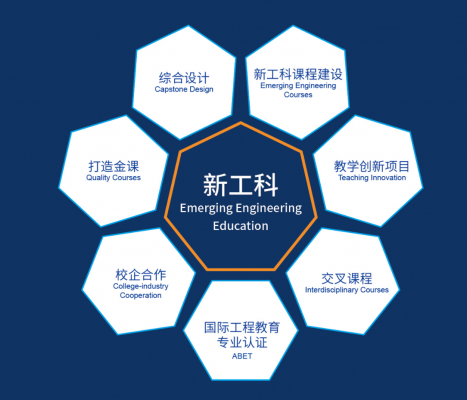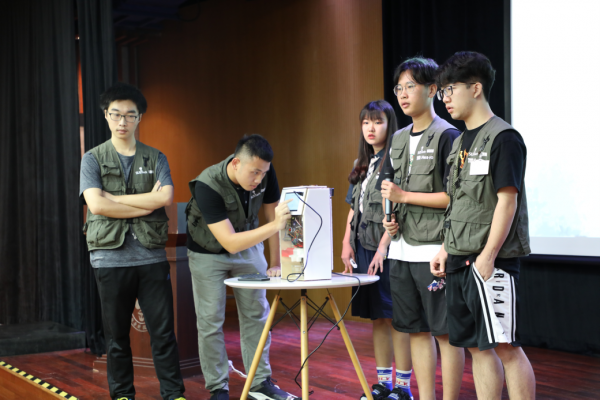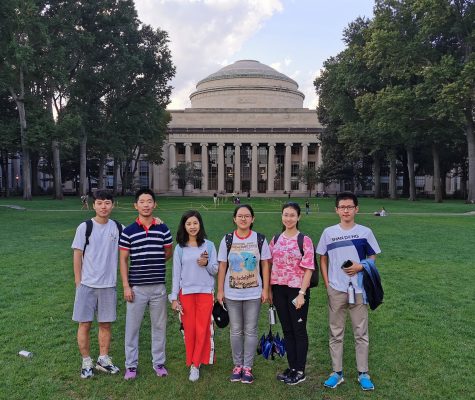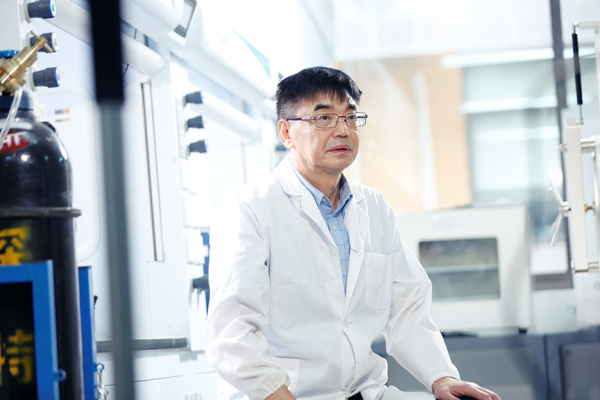Since the establishment of Southern University of Science and Technology (SUSTech), SUSTech has long been a leader in the development of engineering disciplines. Its adherence to world-class university standards has seen SUSTech focus on the forefront of discipline development and departmental construction.
With ten engineering-focused departments and schools, six provincial and 23 municipal key labs and various other institutions within its domain, the College of Engineering (the College) has been providing interdisciplinary research and educational opportunities throughout the College and across campus since its establishment in May 2015.
By breaking down barriers between different engineering disciplines, university resources are more effectively coordinated to generate interdisciplinary innovation in conjunction with industry-university research platforms to better serve society. Currently, the College provides 15 undergraduate programs, and grants one doctoral Degree and two master’s Degrees.
How can higher engineering education become a “powerful engine” for national innovation-driven development? In the context of the new era, how will the College develop a first-class discipline that empowers SUSTech students for Shenzhen and the Greater Bay Area? To this end, we interviewed Professor Xu Zhenghe, Dean of the College of Engineering.
Dean Xu Zhenghe was selected as the College’s founding Dean. His achievements include being a Fellow of the Canadian Academy of Engineering and the Royal Society of Canada, and numerous awards in Canada and China. From 1997 to 2016, he was an associate professor and tenured professor in the Department of Chemistry and Materials Engineering, University of Alberta, Canada. He joined SUSTech in 2017 as Dean of the College of Engineering and Chair Professor in the Department of Materials Science and Engineering.
For many years, he has been engaged in the research area of interfacial science and surface chemistry as applied to natural resources processing and utilization. He has published more than 481 scientific journal papers, which has been cited over 13,000 times, with a h-index of 55. to date. Xu Zhenghe has been issued with seven patents, while he has also published one monograph, two scientific books and written 12 chapters for different books.
With an eye to developing ”Emerging engineering education” for the College of Engineering, Xu Zhenghe believes that his experience of industry-university collaboration and interdisciplinary research were two of the key reasons behind his hiring by SUSTech.
“I have worked with many companies in Canada to do research. Now, on behalf of the College, I can integrate the strengths of each department and transform their basic research results into applications.”
Under the stewardship of Dean Xu Zhenghe, the College has established numerous strategic partnerships with high-tech companies across the Greater Bay Area. These include industrial leaders such as Han’s Laser and Guangyunda 3D printing. Further to this, Chair Professor Wang Haijiang of the Department of Mechanical and Energy Engineering founded Shenzhen Southern Fuel Cell Co. Ltd, focusing on the innovative application of fuel cells, with his company currently valued at close to one billion RMB. Class of 2018 graduate Guo Tianzi opted to start her own business off the back of her own inventions in a composite materials and a special nanometer coating, by establishing Shenzhen SUSTech Composite Materials Technology Co. Ltd. Her company has received funding from RC Investment in Shenzhen to the tune of 3 million RMB.
Emerging Engineering Education at SUSTech
With the Fourth Industrial Revolution practically under way, the boundaries between traditional academic disciplines are becoming blurred under the impact of interdisciplinary studies. Society is more capable of exploring complex topics, thanks to the knowledge explosion, and big data is providing opportunities for scientific and technological innovations.

Under this new paradigm, traditional education models no longer support the needs of the new era, and as such, new pedagogic models are required to support industrial needs for their future leaders. The desire for interdisciplinary future leaders has seen universities across the globe develop talent pipelines that can sustain the creation of new value chains and provide for the betterment of society.
Emerging engineering education takes a more practical and real-world approach to engineering. It applies a comprehensive and interdisciplinary methodology that requires students to pay attention to how they use their knowledge, rather than the theories themselves. The cultivation of high-quality interdisciplinary engineering leaders who can command the future direction of industries in an internationally competitive manner will be of great value, hence the demand for well-developed new engineering education curricula.
The curriculum of emerging engineering education is student centered, allowing for students’ personal development into high-level engineering talents. Curricula should be integrated, optimized and restructured to improve learning effectiveness, particularly in areas such as critical thinking, design thinking, engineering management and ethics, cross-cultural communications and mathematical thinking. Emerging engineering education is intended to instill a desire for lifelong learning in the students, to help them form a conscious and systematic model of thinking that cultivates within them an entrepreneurial and global spirit.
One example is the Comprehensive Design Course (CDC). It seeks to have students work on practical problems through industry-university collaboration. Students across 5 disciplines worked with 6 companies to form teams to solve specific practical problems, under the guidance of corporate and academic mentors in the 2018 academic year. The College held an exhibition to present the students’ outcomes to industry leaders across the Greater Bay Area.

Similarly, the School of System Design and Intelligent Manufacturing (SDIM), has successfully run their Da Vinci Challenge Camps as part of their application of the emerging engineering education curriculum. In the recent summer camp, participants worked on projects that aimed to provide care products for the elderly, using on-the-spot investigations and user pain point analysis. In the final project presentation, the students demonstrated their knowledge and skills acquired in the six-week study of the new subject curriculum system in a range of different areas.
SUSTech’s emerging engineering education has attracted the support of many companies. Dongguan Haili Group recently donated to a special fund to enhance emerging engineering education within the School of System Design and Intelligent Manufacturing.
The College will be advocating its emerging engineering education, encouraging students to imbue themselves with a solid foundation of basic sciences within the first year or two, before determining their direction in the second half of their undergraduate degree. Going forward, the College will examine national and international strategies for a wide range of areas that ultimately support the economic and strategic development of the Greater Bay Area.
To training the next generation of engineering leaders

Zheng Tianqi, Deng Yuqing, Li Heyi, Wang Yueji, Ai Qian, and Zhu Minjiang from the College of Engineering embarked on a journey to study at MIT this September.
SUSTech students are given numerous opportunities to take part in international exchanges as an important supplement to their core study. Whether they travel to the United States, Australia, Singapore or any number of other countries, these exchange programs with the world’s leading universities are primarily aimed at engineering students.
The international promotion of the College is also vital for its development. Xu Zhenghe has a background in education and teaching at prestigious overseas universities. He received his Ph.D. from Virginia Tech University and taught at both McGill University & the University of Alberta in Canada. Dean Xu Zhenghe aims to build a first class college of engineering. Within the process of developing the College of Engineering, Xu Zhenghe aims to strengthen close ties with top engineering college around the world, such as MIT and UBC, while recruiting top professors to educate under the trends of Emerging Engineering Education.
Recently, the Department of Computer Science and Engineering welcomed Turing Award winner Professor Joseph Sifakis as a Distinguished Professor. He will lead a laboratory that focuses on major strategic fields such as artificial intelligence and big data, as they relate to a wide range of interdisciplinary disciplines. The aim is to promote intelligent outcomes and educate future engineering leaders for Shenzhen and the Greater Bay Area.

Xu Zhenghe said: “The College has always closely integrated talent training with national development and industrial needs, with innovation at its core. We need to focus on cultivating innovative future leaders with an international vision, a solid foundation of basic theoretical knowledge and strong practical skills.” He stressed that to be considered of first-class standard, students must first develop a deep love for science and engineering. With so much uncertainty about the future, students must be willing to set out on their own to discover more about their chosen field, in order to work out how to solve the problems they will come across later in life.
Students must also maintain their curiosity and independent thought-process. By constantly thinking about what is happening around them and questioning everything, students are able to discover new problems, make new breakthroughs, generate new ideas, and head into previously unknown scientific fields.
Engineering students should also be creative and innovative. Creativity is a basic requirement, and the ability to co-ordinate reflects their ability to judge the feasibility of the program, and to plan and coordinate appropriately. Leadership is also important. ”A good scientist usually has good communication skills and teamwork skills to lead the team to overcome major scientific challenges.”
Scientists focus on theoretical research, while engineers concentrate on using theoretical design to solve practical problems. The College seeks to cultivate talents with scientist-engineer capabilities. Such an approach aims to inspire its students to study scientific issues, publish high-level academic papers, and apply the acquired scientific principles to solve practical problems. This is only possible with these literacy, independent learning and enterprise skills learned as a result of ”emerging engineering education.”
The Emerging Engineering Education is the future. The College integrates its talent pipeline with national development and strategic industrial demand. The College, under the leadership of Xu Zhenghe, will explore a variety of engineering discipline matters, with a focus on cultivating innovative future leaders for the new era.
Through its promotion of SUSTech’s education system, integrated with its new engineering education, the College will encourage a globalized and well-rounded set of future engineering leaders for the new era grounded in both basic and applied engineering.
Proofread ByXia Yingying
Photo ByWang Kaiqiang, Qiu Yan